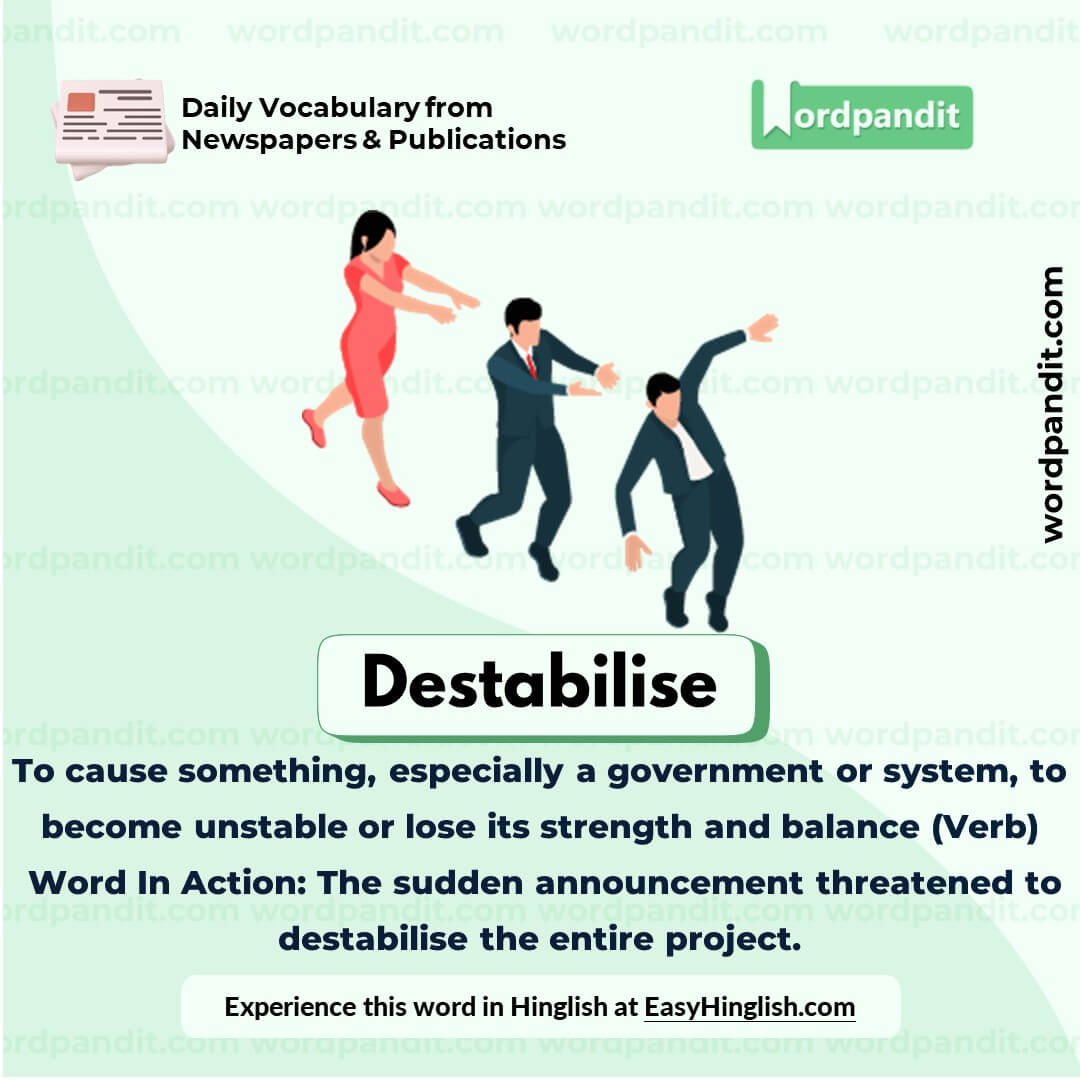Daily Vocabulary from Indian Newspapers and Publications
Welcome to Wordpandit’s Indian Vocabulary Hub
At Wordpandit, we understand the importance of staying rooted in the local context while expanding your language skills. This section focuses on enriching your vocabulary with words and phrases drawn from India’s leading newspapers and publications, ensuring you're learning vocabulary that is practical, relevant, and uniquely Indian.
Why Indian Sources Matter
We believe that the best way to master any language is by immersing yourself in local content. That’s why we carefully curate vocabulary from top Indian publications, including:
- The Hindu
- The Times of India
- The Economic Times
- Hindustan Times
- Live Mint
- The Indian Express
- And many others...
Stay Updated, Stay Relevant
With daily updates from Indian news sources, you’ll be consistently learning words that reflect the trends and shifts in Indian society and culture. Our focus is to provide vocabulary that enhances your understanding of the language in an Indian context.
How Wordpandit Supports Your Goals
Whether you’re preparing for exams, aiming to improve your professional communication, or simply want to stay connected with the latest Indian vocabulary, Wordpandit is here to guide you every step of the way.
Learn with a Practical Approach
Our interactive learning methodology includes real-world examples, engaging activities, and context-specific usage to ensure that every word becomes part of your active vocabulary.
Dive into Indian Vocabulary Today!
Why Choose Wordpandit?
Practical Learning: Focus on words you'll actually encounter in real-world reading, enhancing your comprehension and communication skills.
Diverse Content: From current affairs to scientific breakthroughs, our varied sources expose you to vocabulary across multiple domains.
Effortless Integration: Make Wordpandit a part of your daily routine. Just a few minutes each day can significantly boost your lexicon over time.
Your Path to Vocabulary Mastery
- Visit our Daily Vocabulary section regularly
- Explore new words and their usage in context
- Practice incorporating these words into your own writing and speech
- Track your progress as your vocabulary expands
Start Your Journey Today
Embark on your vocabulary enhancement journey with Wordpandit. By consistently engaging with our daily posts, you'll build a robust vocabulary that serves you well in academic, professional, and personal contexts.
Remember, a word a day keeps linguistic limitations at bay. Make Wordpandit your daily companion in the quest for vocabulary excellence!
WORD-1: Destabilise
Context:
"BBJP MP Sambit Patra accused billionaire-philanthropist George Soros, LoP Rahul Gandhi as well as the OCCRP, an association of investigative journalists, of conspiring to 'destabilise' India." - Indian Express
Explanatory Paragraph:
The word "destabilise" refers to the act of causing instability or disrupting the balance, harmony, or normal functioning of a system, organization, or government. It often carries a negative connotation and suggests deliberate actions taken to create chaos or undermine stability.
Meaning: To cause something, especially a government or system, to become unstable or lose its strength and balance. (Verb)
Pronunciation: dee-STAY-buh-lize
Difficulty Level: ⭐⭐⭐ Intermediate
Etymology: Derived from the prefix "de-" meaning "reverse" or "remove," and "stabilise," which originates from the Latin word "stabilis" meaning "firm" or "stable."
Synonyms & Antonyms:
Synonyms: Disrupt, undermine, weaken, unsettle
Antonyms: Stabilise, strengthen, fortify, secure
Usage Examples:
- The rebel forces aimed to destabilise the government by targeting key infrastructure.
- Economic sanctions can sometimes destabilise a nation's financial system.
- Critics argued that the policy changes would destabilise the healthcare system.
- The sudden resignation of the CEO destabilised the company’s management structure.
Cultural Reference:
"The term 'destabilise' is frequently used in global politics, often to describe efforts by foreign entities to interfere in a nation’s internal affairs, as seen during the Cold War era." - Historical Studies on International Relations
Think About It:
What are some ways in which social media can be used to destabilise public opinion or political systems?
Quick Activity:
Think of an example from history where a major event led to the destabilisation of a government. Briefly write down the causes and consequences of that event.
Memory Tip:
Remember "destabilise" by thinking of removing (de-) the balance (stability) of something. Visualize a table losing its legs to recall the idea of instability.
Real-World Application:
"Destabilise" is often used in political, economic, or social discussions to describe actions or events that disrupt normal functioning, making it a valuable term in current affairs, international relations, and even corporate strategy.
WORD-2: Erupt
Context:
"India protests have erupted across Bangladesh in recent months, fuelled by perceptions that New Delhi backed the Hasina government." - Indian Express
Explanatory Paragraph:
The word "erupt" describes a sudden, often violent, outburst or release of energy, emotions, or action. It can be used for both physical phenomena like volcanoes or metaphorical situations such as protests or emotions. In this context, it signifies the sudden and intense onset of protests in Bangladesh.
Meaning: To burst out suddenly and violently (verb).
Pronunciation: ee-RUHPT
Difficulty Level: ⭐⭐ Beginner
Etymology: From Latin "eruptus," past participle of "erumpere," meaning to burst out, derived from "e-" (out) + "rumpere" (to break).
Synonyms & Antonyms:
Synonyms: Burst, explode, blow up, flare up
Antonyms: Subside, calm, settle, simmer down
Usage Examples:
- The volcano erupted with a thunderous roar, spewing lava into the sky.
- Emotions erupted in the courtroom as the verdict was announced.
- Protests erupted across the city following the controversial decision.
- The room erupted in laughter after the comedian's witty joke.
Cultural Reference:
"Eruption" is often used to describe historic moments of social change, such as the eruption of civil rights protests in the 1960s in the United States, which marked a turning point in the fight for equality.
Think About It:
What are some situations in history or nature where the word "erupt" is particularly appropriate, and what caused those eruptions?
Quick Activity:
List three things that can "erupt" besides a volcano. Try to include both literal and figurative examples.
Memory Tip:
Think of "erupt" as "e-rupt," where "e" stands for energy and "rupt" means break. So, it’s energy breaking out suddenly!
Real-World Application:
"Erupt" is commonly used in news reports, scientific discussions, and everyday conversations to describe sudden, intense events like protests, emotions, or natural disasters.
WORD-3: Conspire
Context:
"BJP MP Sambit Patra accused billionaire-philanthropist George Soros, LoP Rahul Gandhi as well as the OCCRP, an association of investigative journalists, of conspiring to 'destabilise' India." - Indian Express
Explanatory Paragraph:
The word "conspire" refers to the act of secretly planning or agreeing with others to commit an unlawful or harmful act. It often implies secrecy and an intention to deceive or undermine. While it is commonly associated with criminal activities, it can also be used in a broader sense to describe any covert collaboration.
Meaning: To make secret plans with others to commit an illegal or harmful act. (Verb)
Pronunciation: kun-SPIRE
Difficulty Level: ⭐⭐⭐ Intermediate
Etymology: From the Latin word "conspirare," meaning "to breathe together," which combines "com-" (together) and "spirare" (to breathe).
Synonyms & Antonyms:
Synonyms: Collude, plot, scheme, connive
Antonyms: Cooperate, support, assist, aid
Usage Examples:
- The group was accused of conspiring to overthrow the government.
- Two employees conspired to embezzle funds from the company.
- Authorities uncovered a plot where several individuals conspired to rig the election.
- The villains in the story conspired to steal the treasure from the hero.
Cultural Reference:
"The term 'conspire' is famously used in discussions about historical events like the Gunpowder Plot of 1605, where conspirators aimed to assassinate King James I." - Historical Records
Think About It:
Why do you think conspiracies often capture the public's imagination, both in real life and in fictional narratives?
Quick Activity:
Write a short fictional scenario where two or more characters conspire to achieve a secret goal. Highlight their motives and actions.
Memory Tip:
Think of "conspire" as people "breathing together" in secrecy, plotting something hidden from others. The prefix "con-" (together) helps remember its collaborative nature.
Real-World Application:
"Conspire" is a vital term in legal and political discussions, often used in allegations of secretive or unlawful activities, making it relevant in news, history, and even entertainment media.
WORD-4: Emigrated
Context:
"In 1956, he emigrated to the US, where he started initially as an analyst of European securities." - Indian Express
Explanatory Paragraph:
The word "emigrated" refers to the act of leaving one’s native country or region to live permanently in another. It emphasizes the departure from the original country. In this context, it describes someone moving from their home country to the United States to pursue a career.
Meaning: To leave one’s country to settle in another (verb).
Pronunciation: EM-uh-gray-ted
Difficulty Level: ⭐⭐ Beginner
Etymology: From Latin "emigratus," past participle of "emigrare," meaning to move away, derived from "e-" (out) + "migrare" (to move).
Synonyms & Antonyms:
Synonyms: Relocate, leave, move, expatriate
Antonyms: Immigrate, return, stay
Usage Examples:
- She emigrated from India to Canada in search of better job opportunities.
- Many families emigrated to escape the war and rebuild their lives elsewhere.
- During the 19th century, thousands of people emigrated from Europe to America.
- He emigrated to Australia, leaving behind his life in his home country.
Cultural Reference:
The mass emigration of Irish citizens during the Great Famine in the 1840s is one of the most significant historical events, as millions left Ireland to settle in countries like the United States.
Think About It:
What factors make people decide to emigrate, and how does this impact both the country they leave and the one they move to?
Quick Activity:
Identify a famous historical figure who emigrated to another country. Research why they made the move and how it influenced their life or career.
Memory Tip:
Think of "emigrate" as "exit-migrate." It helps you remember that it refers to leaving a country.
Real-World Application:
The term "emigrated" is used in discussions about history, economics, and social studies to explain migration patterns and their effects on individuals and nations.
WORD-5: Ascended
Context:
"He moved to London in 1947 as the communists ascended to power in Hungary. He studied Philosophy at the London School of Economics and obtained his Master of Science in Philosophy in 1954." - Indian Express
Explanatory Paragraph:
The word "ascended" means to rise or move upward, either physically, socially, or metaphorically. In this context, it refers to the communists rising to power in Hungary, marking a significant political change. The term often implies a movement to a higher position or status.
Meaning: To rise to a higher level, position, or status (verb).
Pronunciation: uh-SEN-ded
Difficulty Level: ⭐⭐ Beginner
Etymology: From Latin "ascendere," meaning to climb up, derived from "ad-" (to) + "scandere" (to climb).
Synonyms & Antonyms:
Synonyms: Rose, climbed, elevated, progressed
Antonyms: Descended, declined, fell, sank
Usage Examples:
- The climbers ascended the steep mountain trail despite the harsh weather conditions.
- As she worked hard and demonstrated her skills, she quickly ascended the corporate ladder.
- The balloon ascended into the sky, becoming a tiny dot on the horizon.
- He ascended to the throne after the unexpected death of the king.
Cultural Reference:
The "Ascension of Christ" is a significant event in Christian theology, referring to Jesus Christ rising to Heaven after his resurrection. It symbolizes triumph and elevation to divine status.
Think About It:
What personal qualities or circumstances help individuals ascend to positions of power or influence?
Quick Activity:
Write a short story where a character "ascends" to a new level in their life, whether literally or figuratively. Reflect on the challenges they faced along the way.
Memory Tip:
Think of "ascend" as starting with "A" for "up" (like in the alphabet). This reminds you it’s about rising upward or moving higher.
Real-World Application:
"Ascended" is commonly used in news, literature, and speeches to describe significant rises in power, status, or physical movement, such as leaders ascending to power or objects rising in elevation.
















